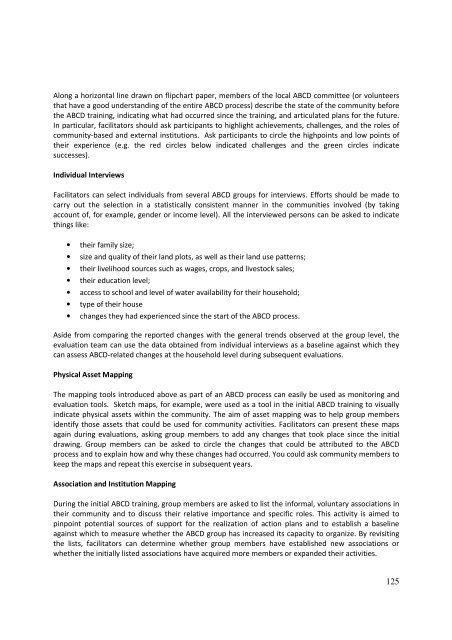ABCD-Training-of-Trainers-Tools-July-2013
ABCD-Training-of-Trainers-Tools-July-2013
ABCD-Training-of-Trainers-Tools-July-2013
You also want an ePaper? Increase the reach of your titles
YUMPU automatically turns print PDFs into web optimized ePapers that Google loves.
Along a horizontal line drawn on flipchart paper, members <strong>of</strong> the local <strong>ABCD</strong> committee (or volunteers<br />
that have a good understanding <strong>of</strong> the entire <strong>ABCD</strong> process) describe the state <strong>of</strong> the community before<br />
the <strong>ABCD</strong> training, indicating what had occurred since the training, and articulated plans for the future.<br />
In particular, facilitators should ask participants to highlight achievements, challenges, and the roles <strong>of</strong><br />
community-based and external institutions. Ask participants to circle the highpoints and low points <strong>of</strong><br />
their experience (e.g. the red circles below indicated challenges and the green circles indicate<br />
successes).<br />
Individual Interviews<br />
Facilitators can select individuals from several <strong>ABCD</strong> groups for interviews. Efforts should be made to<br />
carry out the selection in a statistically consistent manner in the communities involved (by taking<br />
account <strong>of</strong>, for example, gender or income level). All the interviewed persons can be asked to indicate<br />
things like:<br />
• their family size;<br />
• size and quality <strong>of</strong> their land plots, as well as their land use patterns;<br />
• their livelihood sources such as wages, crops, and livestock sales;<br />
• their education level;<br />
• access to school and level <strong>of</strong> water availability for their household;<br />
• type <strong>of</strong> their house<br />
• changes they had experienced since the start <strong>of</strong> the <strong>ABCD</strong> process.<br />
Aside from comparing the reported changes with the general trends observed at the group level, the<br />
evaluation team can use the data obtained from individual interviews as a baseline against which they<br />
can assess <strong>ABCD</strong>-related changes at the household level during subsequent evaluations.<br />
Physical Asset Mapping<br />
The mapping tools introduced above as part <strong>of</strong> an <strong>ABCD</strong> process can easily be used as monitoring and<br />
evaluation tools. Sketch maps, for example, were used as a tool in the initial <strong>ABCD</strong> training to visually<br />
indicate physical assets within the community. The aim <strong>of</strong> asset mapping was to help group members<br />
identify those assets that could be used for community activities. Facilitators can present these maps<br />
again during evaluations, asking group members to add any changes that took place since the initial<br />
drawing. Group members can be asked to circle the changes that could be attributed to the <strong>ABCD</strong><br />
process and to explain how and why these changes had occurred. You could ask community members to<br />
keep the maps and repeat this exercise in subsequent years.<br />
Association and Institution Mapping<br />
During the initial <strong>ABCD</strong> training, group members are asked to list the informal, voluntary associations in<br />
their community and to discuss their relative importance and specific roles. This activity is aimed to<br />
pinpoint potential sources <strong>of</strong> support for the realization <strong>of</strong> action plans and to establish a baseline<br />
against which to measure whether the <strong>ABCD</strong> group has increased its capacity to organize. By revisiting<br />
the lists, facilitators can determine whether group members have established new associations or<br />
whether the initially listed associations have acquired more members or expanded their activities.<br />
125


